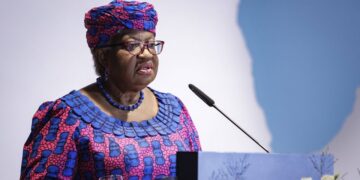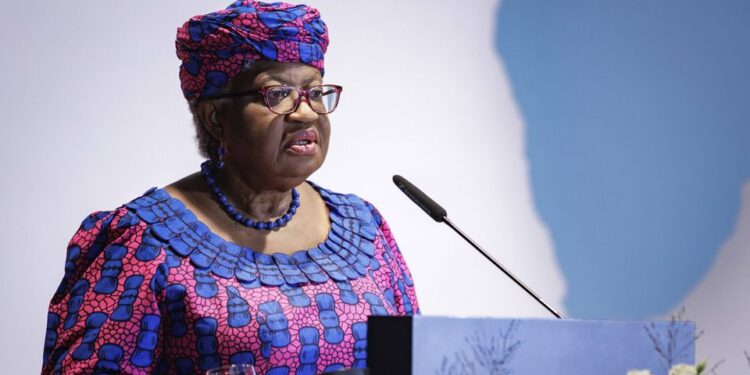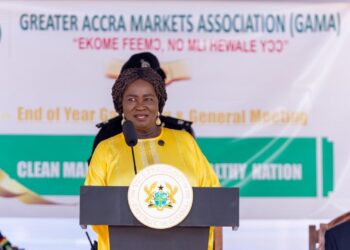The Director-General of the World Trade Organization (WTO) emphasizes the necessity for G20 economies to remove trade restrictions in order to promote global trade and foster growth.
She urged G20 members to “show leadership and contribute to economic stability and growth by unwinding recent and longstanding restrictions on trade.”
In response to the WTO Trade Monitoring Report unveiled last December, Ms. Ngozi Okonjo-Iweala expressed her views, saying “export restrictions on food, feed, and fertilizer in particular continue to contribute to shortages, price volatility, and uncertainty.”
“As the world’s leading economies, G20 countries should roll back trade restrictions and exercise restraint in introducing new ones so that global markets remain open and predictable and products can flow to where they are needed,” she added.
According to the Director-General, the report indicates that from mid-May to mid-October 2023, G20 economies implemented more measures restricting trade in goods than those facilitating it. However, the value of traded merchandise affected by facilitating measures still surpassed that affected by restrictions.
“The report is a cause for concern as it shows that the policy trend amongst G20 economies is moving in the wrong direction, even if they are also taking steps to facilitate trade,” the WTO Director-General added.
The report is presented against the backdrop of persistently slow growth in world trade. The WTO’s latest projection indicates a forecasted merchandise trade volume growth of 0.8% in 2023 (revised from the earlier estimate of 1.7%) and 3.3% in 2024 (nearly unchanged from the previous estimate of 3.2%).
During the first half of 2023, the volume of global merchandise trade experienced a 0.5% year-on-year decline. Factors such as high inflation and increasing interest rates affecting trade and output in advanced economies, along with challenges in the property market hindering a robust post-pandemic recovery in China, contributed to this downturn.
The Trade Monitoring Report highlights that although the trade coverage of import-facilitating measures still exceeded that of restrictive ones in the review period, this gap has significantly narrowed. Import-facilitating measures were estimated at US$318.8 billion (down from USD 691.9 billion in the previous report issued in July 2023), while trade-restrictive measures amounted to US$246 billion (up from USD 88 billion).
For the first time since 2015, the monthly average of 9.8 new trade restrictions introduced by G20 economies during the review period surpassed that of trade-facilitating measures. Furthermore, the persistent stockpile of G20 import restrictions showed no meaningful rollback of existing measures.
As of mid-October 2023, import restrictions implemented by G20 economies since 2009 affected traded goods worth US$2,287 billion, representing 11.8% of G20 imports.
Export restrictions have gained prominence since 2020, initially due to COVID-19 measures and more recently influenced by the war in Ukraine and the food security crisis. While some of these restrictions have been lifted, as of mid-October 2023, 75 export restrictions on food, feed, and fertilizers were still in effect globally.
The implementation of new COVID-19 trade-related measures by G20 economies has slowed over the past five months, with a sharp decline in the number of new COVID-19-related support measures. As of mid-October 2023, 82.9% of G20 COVID-19 trade restrictions had been repealed, leaving 11 export restrictions in place. The trade coverage of the remaining pandemic-related restrictions was estimated at USD 15.1 billion, down from USD 16.2 billion.
During the review period, there was a notable increase in the implementation of new general economic support measures by G20 economies. These measures encompassed a range of initiatives, including programs aimed at reducing environmental impact, promoting renewable energy production, supporting energy efficiency and decarbonization, and backing clean and renewable energy projects. Additionally, various support programs were introduced for sectors such as agriculture, tourism, aviation, and transportation.
The report highlights that a series of crises and the uncertain economic environment continue to exert pressure on international investment, especially on foreign direct investment (FDI). The persistent weakness in FDI poses challenges to achieving the Sustainable Development Goals (SDGs).
This concern is further underscored by the SDG investment gap in developing countries—the shortfall in investment required for these economies to meet the SDG targets. According to data from the Organisation for Economic Co-operation and Development (OECD), this investment gap has alarmingly expanded from US$2.5 trillion to approximately US$4 trillion per year leading up to 2030. This widening gap poses a significant hurdle to the achievement of the SDGs.
The G20’s trade policy direction is increasingly leaning towards more restrictive measures, reflecting a trend of continued sluggish growth in global trade.
The 30th WTO Trade Monitoring Report on G20 trade measures, released on December 18, reveals a recent shift towards more restrictive trade measures introduced by G20 economies. Director-General Ngozi Okonjo Iweala has urged the G20 to exhibit leadership and play a role in fostering economic stability and growth by dismantling both recent and longstanding restrictions on trade.
“As WTO members prepare for the 13th Ministerial Conference in Abu Dhabi in February 2024, G20 economies will play a central role in our efforts to deliver outcomes that strengthen the WTO as a backstop against trade barriers and boost global growth and development.” Director-General Ngozi Okonjo noted.
Background
The WTO trade monitoring reports, initiated by the WTO Secretariat in 2009, provide a comprehensive overview of global trade dynamics. The G20, comprised of Argentina, Australia, Brazil, Canada, China, the European Union, France, Germany, India, Indonesia, Italy, Japan, the Republic of Korea, Mexico, the Russian Federation, the Kingdom of Saudi Arabia, South Africa, Turkey, the United Kingdom, and the United States, represents a collective of major economies whose trade policies and activities are closely monitored in these reports.

































